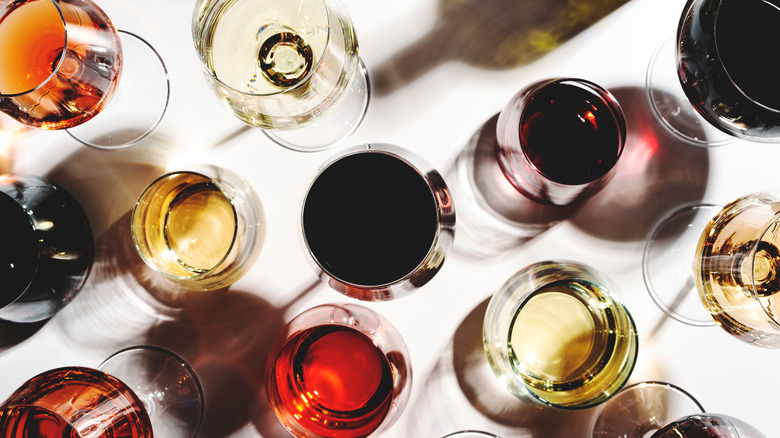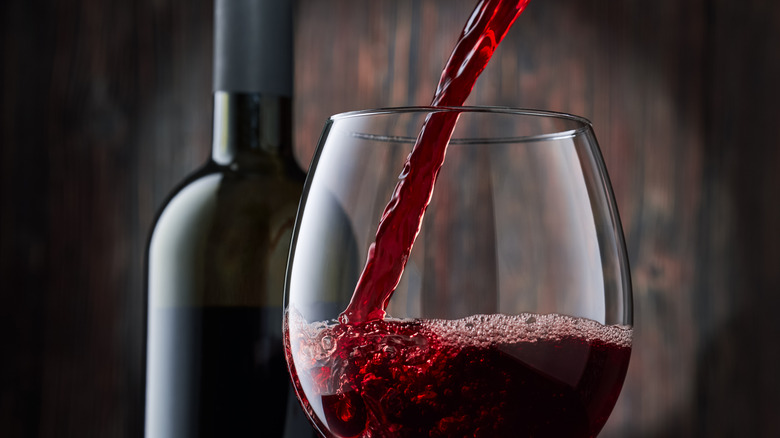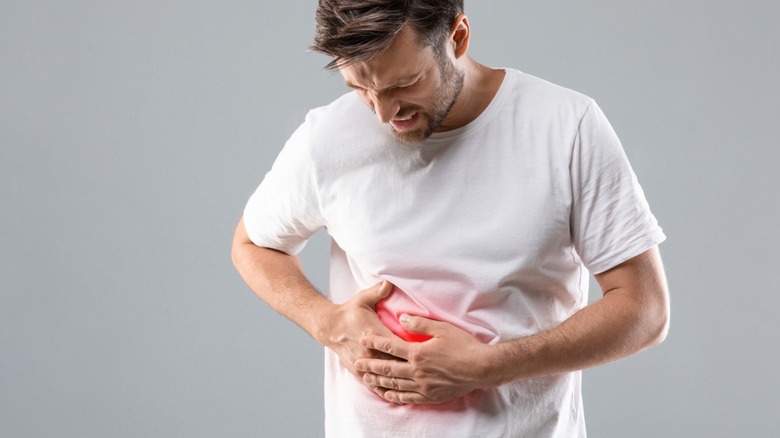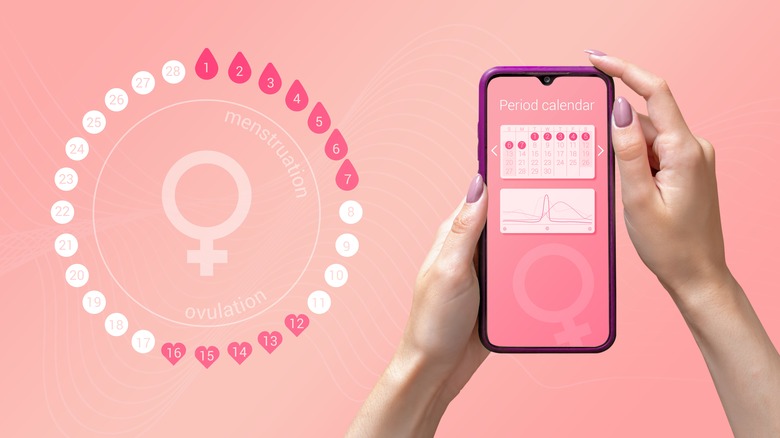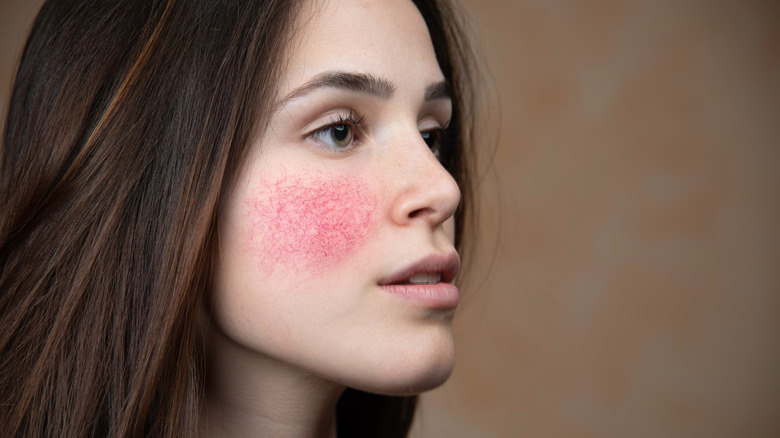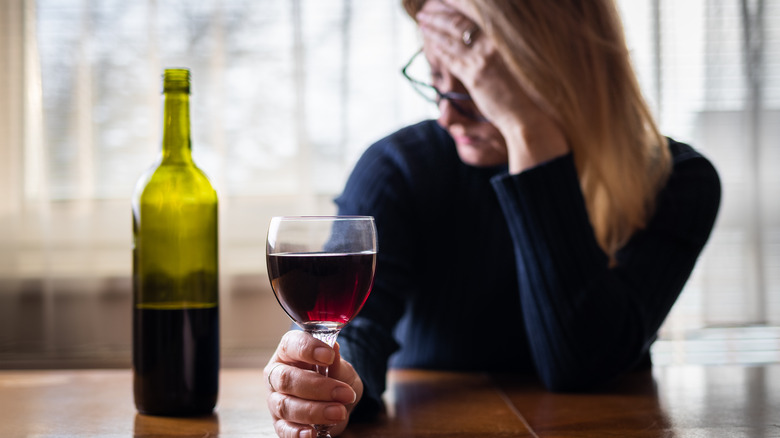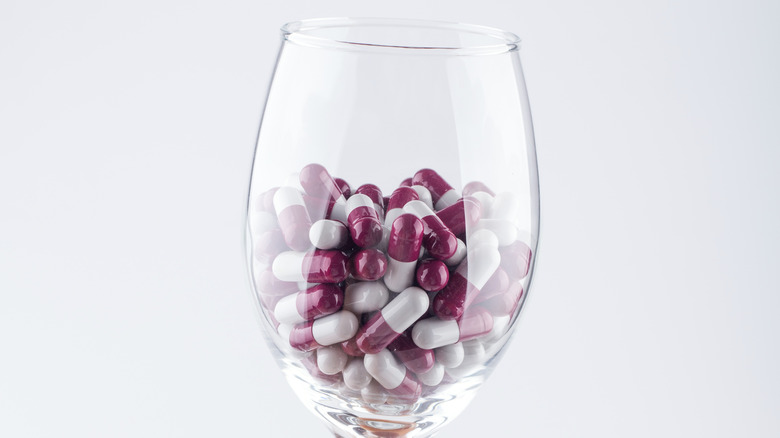Side Effects Of Drinking Wine You Never Expected
Have you ever heard that wine is good for you? Many people choose wine over other alcoholic beverages because it feels like the "healthier" option. As a product of grapes, it's almost like a serving of fruit, right? Many articles tout the health benefits of wine, and research data shows that drinking an occasional glass of red wine can actually be good for your health (via Healthline). People are catching on.
As a matter of fact, wine is trending — sales in the United States have increased 16.8% from 2020 to 2021, according to Forbes. A majority of Americans (about 60%) drink wine occasionally, with about 34% enjoying a glass at least once a month. Millennial and city dwellers are more likely to drink wine, too (via YouGov America).
But is wine actually good for you? How do we define the term "occasional glass of wine," and what are the side effects (good or bad) of drinking wine?
Red wine can help (and hurt) your heart
Drinking red wine is believed to be good for cardiovascular health, and might even lower your risk of a heart attack (via Eat This, Not That). According to one scientific study, red wine consumption has been linked with a decreased risk for coronary heart disease. This is believed to be due to its high amounts of polyphenolic compounds, including the antioxidant resveratrol. In fact, there are many studies that show a connection between moderate red wine consumption and a healthy heart (via Medical News Today). So should we say, bottoms up? Not necessarily.
The key, of course, is moderation. According to the Centers for Disease Control and Prevention (CDC), drinking in moderation is defined as two drinks or less per day for men and one drink or less a day for women. Excessive alcohol consumption can actually cause heart issues, like atrial fibrillation, a rapid and irregular heartbeat (via Eat This, Not That). "It's unclear whether red wine is directly associated with this benefit or whether other factors are at play," said Dr. Robert Kloner, who works in cardiovascular research at Huntington Medical Research Institutes. "It might be that wine drinkers are more likely to have a healthier lifestyle and a healthier diet" (via American Heart Association).
Red wine has other benefits beyond cardiovascular health
The occasional glass of red wine is also linked with other interesting health benefits. Some scientific studies show the antioxidant resveratrol (briefly mentioned earlier) in red wine can help lower cholesterol and blood pressure (via American Heart Association). One study even found that the polyphenols in red wine can have a positive impact on the gut microbiome, contributing to your gut health.
Another study found that light to moderate consumption of red wine contributed to a lower risk of dementia, due to its polyphenol compounds that have anti-inflammatory and neuroprotective properties. One fascinating study based in Italy suggests that drinking wine can even cause you to live longer; it found that men between the ages of 45 to 64 "drinking about 5 drinks per day have a longer life expectancy than occasional and heavy drinkers" (via International Journal of Epidemiology). The study focused primarily on men who consumed wine during meals, which is common in Italian culture.
Wine increases your chance of developing cancer
While some scientific studies suggest that the resveratrol in red wine may help reduce your risk of some types of cancer, the potential negative side effects of alcohol may counterbalance any prospective benefits from resveratrol. Drinking wine, and other alcoholic beverages, contributes to oxidation, adds toxins to the body, and can damage your body tissues (via Medical News Today).
As a matter of fact, drinking wine can increase your risk of getting certain types of cancers. According to the National Cancer Institute, there is strong scientific evidence that links alcohol consumption and developing types of head, neck, liver, breast, esophageal, colon and rectum cancers. Even moderate wine consumption can increase your chance of breast and esophageal cancer, according to some medical experts (via Eat This, Not That). Furthermore, even if you swear off alcohol consumption for good, it may take many years for your sobriety to pay off — halting drinking alcohol is not linked to an immediate decrease in your risk for cancer. "The cancer risks eventually decline, although it may take years for the risks of cancer to return to those of never drinkers" (via National Cancer Institute).
It's tough on your liver
Drinking any type of alcohol, including wine, requires your liver to operate. Your body can't store alcohol — it has to metabolize it right away. When your liver has too much alcohol to process, it prevents its ability to breakdown fat, which can lead to fatty liver disease over time. In fact, this disease is seen in 90% of individuals who consume more than 45 to 60 ounces of alcohol every day (via News Medical Life Sciences). There are often no signs of symptoms of this condition, so it's important to get regular medical check-ups on your liver, especially if you drink alcohol regularly.
Fatty liver disease is the first indication of alcohol-related liver issues; if left untreated, it can lead to cirrhosis, where the liver becomes heavily scarred and damaged, making it difficult to function properly. Liver damage from cirrhosis is usually irreversible (while fatty liver disease can be reversed).
There are many causes to cirrhosis, but long-term alcohol consumption is one of them — another reason why moderation is key. Symptoms usually don't show up until the liver damage is extensive, and can include things like feeling tired, easily bleeding or bruising, loss of appetite, nausea, edema, weight loss, itchy skin, and jaundice (via the Mayo Clinic).
Wine can ruin your sleep
It can be so tempting to drink wine as a nightcap, especially when it works as a sedative. But having alcohol in your system as you drift off to sleep can actually lead to sleep disruption, contributing to insomnia or other serious sleep problems (via the Cleveland Clinic). This is because as you sleep, your body metabolizes the alcohol, making the sedative nature less effective.
"This prevents you from getting the deep sleep and rapid eye movement (REM) sleep you need because the alcohol in your system keeps you in lighter stages of sleep," says Dr. Jessica Vensel Rundo, a neurologist and sleep expert. "You'll likely wake up easily and more often, especially in the later half of the night."
Drinking alcohol, including wine, before bed can also cause other unsettling sleep issues, like lucid nightmares, sleepwalking, breathing problems, and parasomnias like sleep paralysis. If you have sleep issues, it may be a good idea to practice moderation, or cut out drinking alcohol altogether, according to the Cleveland Clinic.
Affects your menstrual cycle
Contrary to popular belief, drinking a glass of wine may not help take your premenstrual syndrome (PMS) pain away. Alcohol consumption can cause your estrogen and testosterone levels to go up, which can amplify PMS symptoms like mood swings and irritability. It can also increase inflammation, which can intensify menstrual cramps (via Flo). That being said, everyone is different, so if a glass of wine during your period does seem to help you, more power to you.
In addition, consistent drinking can cause changes in your hormonal balance, leading to an irregular cycle. It can also cause other fertility issues, like difficulty getting pregnant, changes in ovulation, and sometimes even stopping your cycle altogether. This means, whether you're trying to get pregnant or tracking your cycle as a method of birth control, alcohol could disrupt the cycle, causing your timing to be off. And the fertility issues don't just rest on the woman — since consuming alcohol has a negative impact on both the number and health of sperm, according to Flo.
Wine impacts male fertility
While some studies suggest that the antioxidant resveratrol in red wine may help support male fertility, there isn't enough evidence to back up this claim. Additionally, the negative effects of alcohol on male fertility might outweigh the positives of resveratrol in this case as well (via Eat This, Not That). Like mentioned earlier, many studies have shown a reduction in sperm health in men who regularly consume alcohol. One study points out that heavy alcohol use and intoxication can also contribute to sexual dysfunction, including disinterest or desire for sex, performance issues, and erectile dysfunction, which all negatively affect conception and fertility (per Fertility Research and Practice).
However, the study does specify that low-to-moderate alcohol consumption does not seem to heavily affect sperm quality or quantity in men. This is another example of the importance of moderation. According to the study, only more than 20 drinks per week contributed to increased male fertility issues.
It can cause rosacea
Many studies suggest that drinking alcohol can increase your chances of developing rosacea, a common skin condition. Rosacea causes the cheeks to become red and flushed, almost like blushing, but can also include acne-like bumps. It can last for weeks, or even months, then go away for periods of time. It can happen to anyone, but is most commonly seen in middle-aged white women (via the Mayo Clinic).
According to Dr. Anna Chacon, a board-certified dermatologist, "Studies have shown an increase in the number of blood vessels in the cheeks in wine drinkers. Only visible blood vessels are notably increased in heavy versus moderate drinkers of wine — this supports the idea that wine is associated with rosacea" (via Eat This, Not That). One particular study that looked at women in the United States over a 14 year period found that those women who drank white wine or hard liquor had a greater chance of getting rosacea than other women in the study. However, it is important to note that not everyone who has rosacea gets it from drinking alcohol (via the American Academy of Dermatology Association).
You might be allergic to wine
Many people are allergic to wine and just don't know it. While rare, allergic reactions to wine can happen. In fact, according to one scientific study, about 10% of the population is allergic to alcohol, in particular red wine (via Allergologie Select). Signs to look out for including a runny nose; congestion; burning, itching, or swelling on the lips, mouth or throat; rash or hives that are sometimes itchy; digestive issues; and difficulty breathing. It's also important to look out for anaphylaxis, a severe allergic reaction that requires immediate medical attention. It displays similar symptoms to regular allergies, in addition to other more alarming signs like wheezing, coughing, throat swelling, rapid heartbeat, low blood pressure and feeling light-headed or fainting (via Healthline).
Additionally, it can be hard to distinguish between a wine allergy and alcohol intolerance, which both share similar symptoms. Allergies are usually a result of an uncommon immune response to something in the wine, while alcohol intolerance occurs when your body can't break down the alcohol — this can develop over time, with consistent alcohol use, or might even be genetic (via Healthline).
Wine can make you gain weight
Wine is full of calories, but it isn't very filling, unfortunately. A standard glass of wine can be between 100 and 150 calories (via Eat This, Not That). You've probably heard of the term "empty calories" — most alcoholic beverages do not have nutrients or fiber, making them fit into this category quite nicely. Plus, sometimes wine can go down easy, and you might lose count of the glasses. If you end up consuming more calories than you burn, it can lead to weight gain. Additionally, when you drink alcohol, your body has to process it before carbohydrates or fat — and if there's a lot of alcohol to process, those nutrients might be stored as fat instead (via Healthline).
And then there's the fact that high alcohol intake is linked with a poor diet, notes Healthline. It's much easier to make unhealthy choices while intoxicated, or even the next day, when you have a gnarly hangover and just want to eat pizza on the couch.
A glass a day can relieve anxiety and depression
Another reason to drink red wine — studies show that low to moderate consumption of red wine can help decrease mental and emotional struggles like anxiety and depression. It makes sense why wine is such a common go-to beverage after a long, stressful work day or social gathering. Wine seems to have antidepressant properties that help reduce stress and anxiety, due to the neuroprotective effects of resveratrol (via Food NDTV).
According to one scientific study, individuals that consumed a moderate amount of wine (which was considered two to seven glasses per week) had a low chance of feeling depressed. Interestingly, the results remain consistent when considering other lifestyle factors like being married, smoking, and diet, pointing to wine being the main source of stress relief (via Medical News Today). However, this is another example why moderation is key — the study also found that drinking more than seven glasses of wine a week may increase depression.
Too much wine can cause anxiety and depression
Do you ever feel sad the next day after drinking wine? Alcohol is a depressant, which means that it lowers neurotransmission levels, and can affect chemicals in your brain like serotonin and dopamine (per Health Service). These are your "happy hormones" — serotonin effects your feelings of happiness, concentration, and calm, while dopamine controls motivation and inspiration (via Simply Psychology). So, while one glass of wine may help you relax, too many glasses can lead to a limited supply of these chemicals in your brain the next day, which may cause you to feel anxious, sad, or depressed.
Alcohol can also alter your brain chemistry to the point that it can cause anxiety and panic attacks, even in people who have never experienced them before, according to Health Service.
Then there's the dreaded hangover guilt — "beer fear" and "hangxiety" — whatever you want to call it. It happens to the best of us: You have one too many glasses of wine and do (or say) something you regret the next day. Remember, moderation is key.
Sulfites in wine can cause negative side-effects
Sulfites are commonly added to food and beverages as a preservative. If you've ever read the back of a wine bottle, you've probably seen sulfites listed as an ingredient. Many people can consume sulfites with no noticeable effects, but some individuals are sensitive to them. People can have sulfite-sensitive asthma, resulting in an extreme asthma reaction, and others can actually be allergic to them altogether. Some people with sulfite-sensitivity can have reactions similar to allergies, like hives, rashes, digestive or respiratory issues. There are also people who lack the enzyme, sulfite oxidase, which helps break down sulfites in the body (via WebMD).
Additionally, for some, it's common to get a headache after consuming sulfites (via Love to Know). If you find that you are sensitive to sulfites, sulfite-free wines are becoming more popular and common on many grocery store shelves. It's also good to know that wines labelled organic can not contain sulfites — but beware, if it's "made with organic grapes," sulfites can be added later during production (via WebMD). It's a good idea to always thoroughly read the label.
It doesn't mix well with medication
You may already know that prescription medication and alcohol should not be consumed together — most warning labels for both state so. But this also goes for over-the-counter medications, as well as natural supplements. Many medications already have side-effects, and consuming alcohol can intensify these. Drinking alcohol with certain medication can cause serious side effects, like nausea, vomiting, headaches, drowsiness, fainting, loss of coordination, internal bleeding, heart problems, and breathing difficulty. Alcohol can also affect the medication, making it less effective or even toxic (via National Institute on Alcohol Abuse and Alcoholism).
Mixing meds and alcohol can be life-threatening, causing an overdose, alcohol poisoning, or even death (via Very Well Mind). Also, keep in mind that even if the label doesn't specifically say to avoid alcohol, you can't assume that it's safe. The list of common medications that should never be mixed with alcohol is quite long, so always check with your doctor first if you are unsure.

